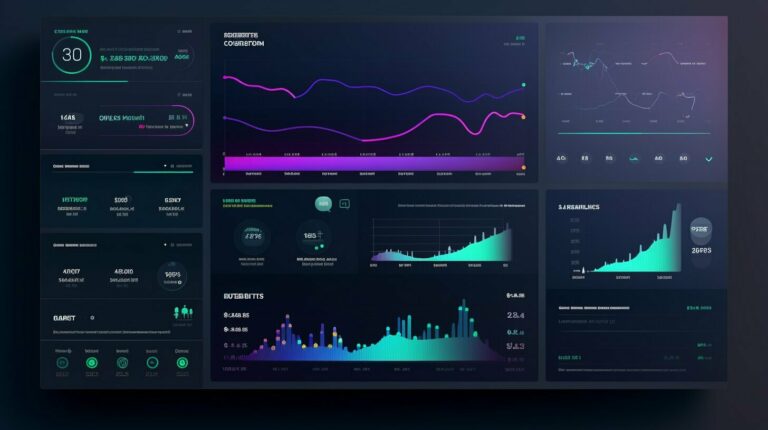Node.js is a popular open-source JavaScript runtime that allows developers to build server-side applications. With its built-in HTTP module, Node.js can be used to create efficient and scalable web servers. In this section, we will explore the process of creating web servers in Node.js using the HTTP module and highlight the advantages of using Node.js for server-side development.
Additionally, we will delve into the performance considerations and provide an overview of the top Node.js web servers in the market. By the end of this section, you will have a better understanding of Node.js web servers and how to leverage them for your next server-side project.
Key Takeaways:
- Node.js has a built-in HTTP module for creating web servers
- Node.js is efficient, scalable, and able to handle concurrent requests
- There are various Node.js server frameworks available for developers
- Performance optimization and security are important considerations for Node.js web servers
- The top Node.js web servers in the market have different features and performance benchmarks
Understanding Node.js Web Servers
If you’re new to Node.js web servers, it can be challenging to navigate the available resources and understand how they work. In this section, we will provide a comprehensive understanding of Node.js web servers, guiding you through the process of building your own web server using Node.js.
Before we dive into the details of building a Node.js web server, let’s explore some examples of popular Node.js web servers:
| Name | Description |
|---|---|
| Express | Fast, minimal, and flexible web framework for Node.js. |
| Koa | New web framework designed by the team behind Express, which aims to be more modular and lightweight. |
| Hapi | Configuration-centric framework for building web applications and services. |
Now that we’ve explored some examples, let’s look at how to build a Node.js web server.
The first step is to install Node.js and its package manager, npm. Once you have these installed, you can create a new Node.js project and install the required dependencies. You can then create a file called server.js to start building your web server.
In this file, you can import the necessary modules and define routes for your application. For example, you can define a route that listens for HTTP GET requests and returns a JSON response.
const http = require(‘http’);
const server = http.createServer((req, res) => {
if (req.method === ‘GET’ && req.url === ‘/hello’) {
res.writeHead(200, {‘Content-Type’: ‘application/json’});
res.end(JSON.stringify({message: ‘Hello World!’}));
}
});
server.listen(3000, () => {
console.log(‘Server running on port 3000’);
});
In this example, we create an HTTP server object using the createServer() method, which listens to the specified port and IP address. We then define a route that listens for GET requests to the /hello URL and returns a JSON response with the message “Hello World!”. Finally, we start the server using the listen() method, which listens for incoming requests from clients.
Once you’ve built your Node.js web server, you can start testing it by sending requests to the server using tools such as Postman or cURL.
While building a Node.js web server can seem daunting at first, it becomes easier with practice. In the next section, we’ll explore the various Node.js server frameworks available to developers that can help simplify the process and provide additional functionality.
Exploring Node.js Server Frameworks
Node.js server frameworks are essential in building server-side applications. These frameworks offer a range of features, from routing and templating to real-time communication and database integration. Choosing the right Node.js server framework is key to maximizing your application’s performance and delivering a seamless user experience.
Common Node.js Server Frameworks
Some of the most popular Node.js server frameworks include:
| Framework | Description |
|---|---|
| Express.js | A minimalist framework for building web applications and APIs, featuring robust routing and middleware functionality. |
| Koa.js | A lightweight framework that emphasizes modularity and provides a range of middleware options, including error handling and response time analysis. |
| Hapi.js | A configuration-centric framework that prioritizes extensibility and security, offering features such as input validation and authentication. |
| Socket.io | A real-time communication framework that enables bidirectional event-based communication between the server and client. |
There are also many other Node.js server frameworks to choose from, each with its own strengths and weaknesses depending on your specific use case.
Choosing the Right Node.js Server Framework
When selecting a Node.js server framework, it’s important to consider a variety of factors, such as:
- The size and complexity of your application
- Your team’s experience and skill level
- Performance requirements, such as handling high traffic or real-time communication
- The need for features such as security, caching, and database integration
By evaluating these factors and exploring the available Node.js server frameworks, you can make an informed decision that maximizes your application’s potential.
Advantages of Node.js Web Servers
Node.js has become a popular choice for server-side development due to its various advantages over traditional web server technologies. Let’s explore some of the key advantages of using Node.js for web server development.
Efficiency and Scalability: Node.js is built on a single-threaded, event-driven architecture that enables it to handle multiple requests simultaneously. This makes it highly efficient and scalable, allowing it to handle large amounts of traffic with ease.
Real-time Communication: Node.js enables real-time communication between the client and server using web sockets. This makes it ideal for building applications that require real-time data exchange, such as chat applications or online gaming platforms.
Boosted Developer Productivity: Node.js has a vast library of pre-built modules and packages, which makes it easy for developers to build, test, and deploy applications quickly. Additionally, its familiarity with JavaScript allows developers to switch between client-side and server-side development with ease.
Overall, Node.js web servers offer a powerful and versatile solution for modern web development. Their efficiency, scalability, and ability to handle real-time communication make them an excellent choice for building web applications that meet the demands of today’s users.
Node.js Server Performance Considerations
When building web servers using Node.js, it is crucial to consider performance optimization strategies to ensure that your server can handle high traffic loads. Here are some techniques that developers can use to optimize Node.js server performance:
1. Event Loop Handling
The event loop is the backbone of Node.js servers. As such, it is essential to handle it properly to avoid performance issues. Developers can leverage methods such as setImmediate(), process.nextTick(), and setTimeout() to manage the event loop. Using these methods appropriately can help reduce the delay in processing requests and improve server performance.
2. Caching Mechanisms
Caching is an effective way to reduce the number of requests that a server needs to process, thereby improving performance. Developers can use caching mechanisms like Redis and memcached to store frequently accessed data in memory, reducing the number of database queries and disk access.
3. Load Balancing
Load balancing is the process of distributing incoming requests across multiple servers to reduce the load on individual servers. Developers can use load balancing mechanisms to distribute requests across multiple Node.js servers, improving the overall performance and availability of the application.
4. Error Handling
Error handling is an essential aspect of server performance. Developers should handle errors properly to avoid crashes and improve server availability. Using tools like Node.js domain and Express.js error handlers can help developers catch and handle errors, ensuring smooth server operation.
5. Code Optimization
Developers can optimize Node.js code to improve server performance. Techniques such as minimizing the use of synchronous functions, avoiding global variables, and using streams can help reduce server processing time and improve overall performance.
By implementing these performance optimization techniques, developers can enhance the efficiency and scalability of Node.js web servers and create applications that can handle large volumes of concurrent requests.
Top Node.js Web Servers in the Market
If you’re looking for the best Node.js web servers for your project, there are several options available in the market. Here, we will provide an overview of the top Node.js web servers based on their features, performance, and popularity among developers.
| Web Server | Description | Features | Popularity | Performance |
|---|---|---|---|---|
| Express | A minimalist and flexible Node.js web application framework | Robust routing, middleware support, MVC architecture, templating engines | Most popular Node.js web framework, used by 47% of Node.js developers | Fast performance, can handle multiple requests simultaneously |
| Koa | A lightweight and expressive Node.js web framework | Streamlined middleware flow, error handling, async/await support | Increasingly popular among developers, used by 9% of Node.js developers | Faster than Express in some benchmarks, supports HTTP/2 and WebSockets |
| Hapi | A rich framework for building applications and services | Configuration-based routing, input validation, authentication, caching, plugins | Used by 4% of Node.js developers | Good performance, offers caching and precompilation for faster responses |
| Fastify | A fast and low-overhead web framework | Schema-based request and reply validation, async hooks, logging, plugins | Increasingly popular among developers, used by 2% of Node.js developers | Fastest web framework in some benchmarks, low memory consumption, supports HTTP/2 and WebSockets |
It’s essential to choose the right Node.js web server based on your project’s requirements. Express is a safe bet for most web applications, given its wide adoption and extensive community support. However, if you need improved performance and modern features, Koa or Fastify could be the right choice. Additionally, Hapi offers a rich set of features out of the box, making it an excellent option for larger-scale applications.
Ensuring Node.js Server Security
Node.js web servers have become increasingly popular in recent years due to their efficiency, scalability, and ability to handle concurrent requests. However, with this popularity comes the potential for security vulnerabilities, making it imperative for developers to ensure that their Node.js servers are secure.
One common security vulnerability is the lack of input validation, which can allow attackers to inject malicious code into the server. To prevent this, developers should validate all user input and sanitize any inputs that appear in HTML output to prevent cross-site scripting (XSS) attacks.
Another crucial aspect of Node.js server security is authentication. Developers must ensure that only authorized users can access sensitive data or perform privileged operations. This can be achieved through various authentication mechanisms, such as OAuth or JSON Web Tokens (JWT).
Furthermore, developers must protect their Node.js servers against SQL injection attacks, which can occur when untrusted data is included in SQL queries. To prevent this, developers should use parameterized queries or prepared statements to ensure that the server only executes trusted SQL commands.
In addition to these measures, developers can also leverage other security tools and techniques, such as HTTPS encryption, SSL certificates, and firewalls, to further secure their Node.js servers. Implementing these best practices can help ensure the security of your Node.js web server and protect against potential attacks.
Conclusion
Node.js web servers provide an efficient and scalable solution for modern web development. By leveraging the built-in HTTP module, developers can create web servers in Node.js that handle concurrent requests and enable real-time communication. In addition, Node.js server frameworks such as Express.js and Hapi.js offer a range of features and benefits, making them popular choices among developers.
When using Node.js web servers, it’s important to consider performance optimization techniques such as caching and handling high traffic loads. By doing so, you can ensure that your server is able to handle the demands of your application.
There are several top Node.js web servers available in the market, each with their own unique features and performance benchmarks. By choosing the right web server for your project, you can ensure that your application runs smoothly and efficiently.
Securing Your Node.js Web Server
As with any web server, security is a critical consideration when using Node.js. Input validation, authentication, and protection against attacks such as cross-site scripting (XSS) and SQL injection are important measures to take when securing your Node.js server. By following best practices for Node.js server security, you can help prevent potential security vulnerabilities.
Overall, Node.js web servers offer a range of benefits for developers looking to create efficient, scalable, and secure applications. By following best practices and leveraging the appropriate server frameworks, you can create powerful web applications that meet the demands of modern web development.







